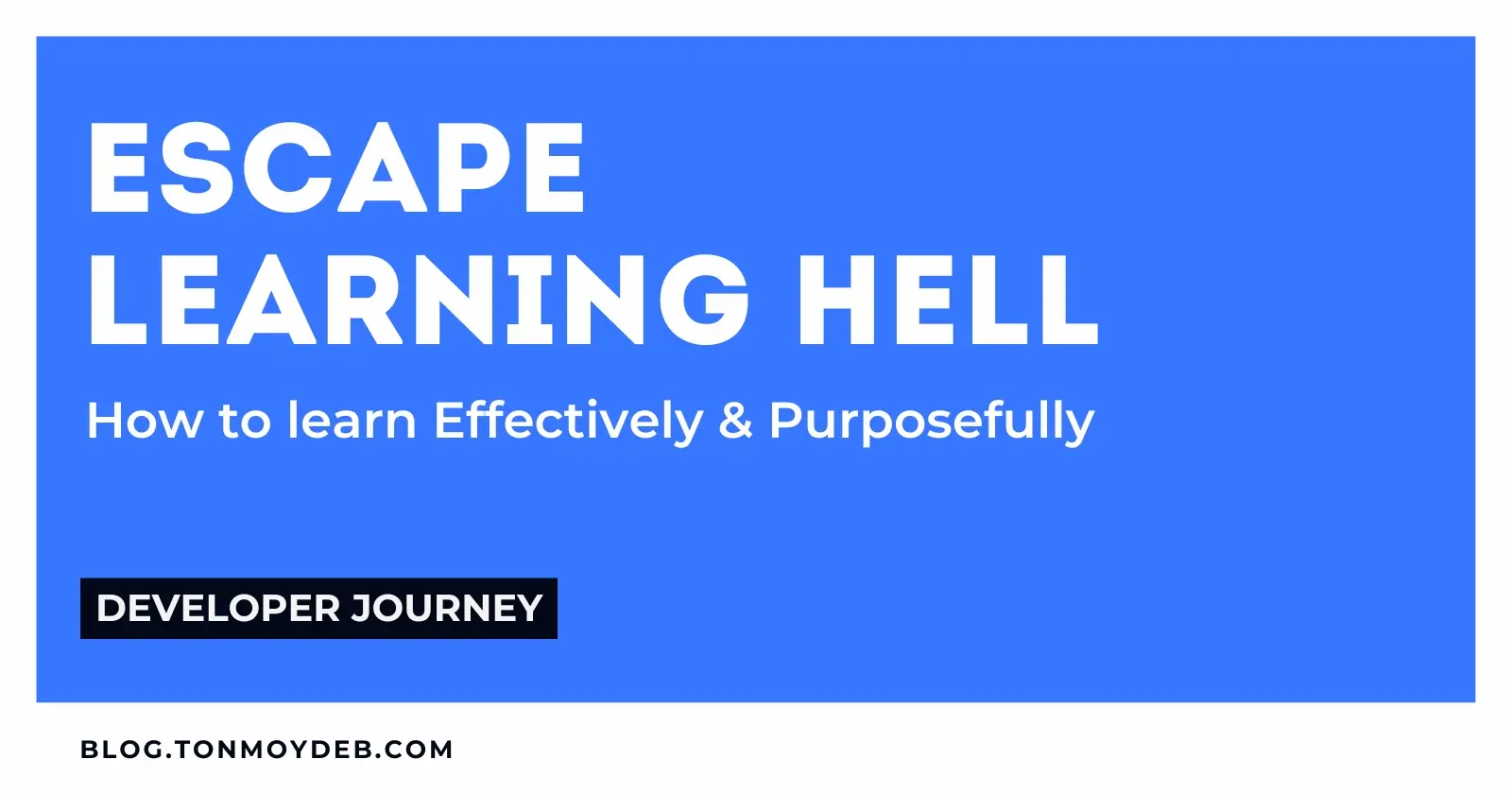Escape Learning Hell: How to Learn Effectively and Purposefully
 Tonmoy Deb
Tonmoy Deb
Introduction
It’s another day, and we are still here. As software developers, we always find ourselves being asked to learn, be it a new tool, framework, or programming language. But today, let's step away from that for a moment. I want to talk about something different: things we learn to stay abreast of the industry trends or enhance our careers even though we might not have a legitimized need for these right now.
You may be just starting out, laying down a foundation for some good job opportunities. Or you may be in the game for quite a while, but still seeking for the next skill to stay fresh. But I would pose a more critical question to you: Are we, in fact, learning effectively? Is all this knowledge of real value; or are we just filling our heads with information that serves no purpose? Let us go check that.
My Experience
Speaking from personal experience, I'm a self-taught developer who has primarily worked with JavaScript. Lots of time, I learned other languages like Python and Rust. But that did not really help me.
Why? That is because I had no real purpose for learning them.
It's just that I got caught up in the hype of learning them and after a week I lost the fervor to continue.
The same goes for other technologies. While I was learning React.js, someone suggested I use React-Query since it was something that would impress a recruiter in an interview. I tried it and I learned pretty much all the basics, but if you asked me to write some code with it right now I would not be able to do it.
Why? Because there was never a real case to use it. I learned it, but not using it in practice allowed that information to slip away. That's the whole wasted learning.
Learning Hell
Many developers find it hard to get out of Tutorial Hell-a death spiral where videos are found constantly playing on a side of the screen while the student never executes their knowledge on the opposite side. Learning Hell is another variant of this trap.
In this stage, you’re running on a treadmill of perpetual learning. You will never feel ready to apply your thing, so instead, you keep stacking up the knowledge. It feels like progress, but, in truth, you're merely overwhelming your brain with information that you will never use.
If you can't really use what you've learned, what is the point of it all? In real-life problem-solving, you don’t need not know everything. The best way to learn is still through working on a project, and thereby solve whatever problem may arise, rather than benching yourself for life with a hundred tutorial courses on theory alone.
The Consequences
Perhaps you are wondering: "If learning is such a good thing, then why are you discouraging it?" No, I'm not discouraging it. Learning must be done every day. However, I have seen many aspiring developers lose themselves in Learning Hell and, as a result, abandon their development careers. The entire experience leaves them so disillusioned that they can hardly continue.
Despite their good education, many programmers can't hold down a job because they're always questioning themselves. So they just keep learning instead of putting their knowledge to use. A few manage to get jobs but change careers for the mere reason of being utterly frustrated with the perpetual openness of learning.
Solution
So, what should you do instead?
Start Building: Instead of learning everything at once, try to apply your knowledge by building real projects. Try to find some problems that you face regularly & solve them using your existing knowledge.
Learn as you go: When you’re building stuff, you might realize that your existing knowledge is not enough. You might need additional knowledge to complete a feature in your project. then go and learn it. at first, no need to dig deep. try to solve your problem first.
Find Purpose: Focus on the technologies that align with your work or goals. Ignore the unnecessary hype. If you find something that you don’t need today but is useful in the future then you can invest time and try to apply that with your regular life. so your investment won’t go wrong.
Conclusion
Learning is important, but purposeful learning pays off your effort. So don’t just learn—try to apply what you learn and find a purpose for why you're learning. Is it really important to you?
I’m also a victim of this, but I tried to overcome it, and I hope this article will help you overcome the problem as well. If you found this helpful, don’t forget to share it with other developers who might be struggling with the same issue.
Subscribe to my newsletter
Read articles from Tonmoy Deb directly inside your inbox. Subscribe to the newsletter, and don't miss out.
Written by

Tonmoy Deb
Tonmoy Deb
Web app developer who loves clean, organized code. Passionate about building projects, solving problems, and sharing knowledge through insightful coding blogs.